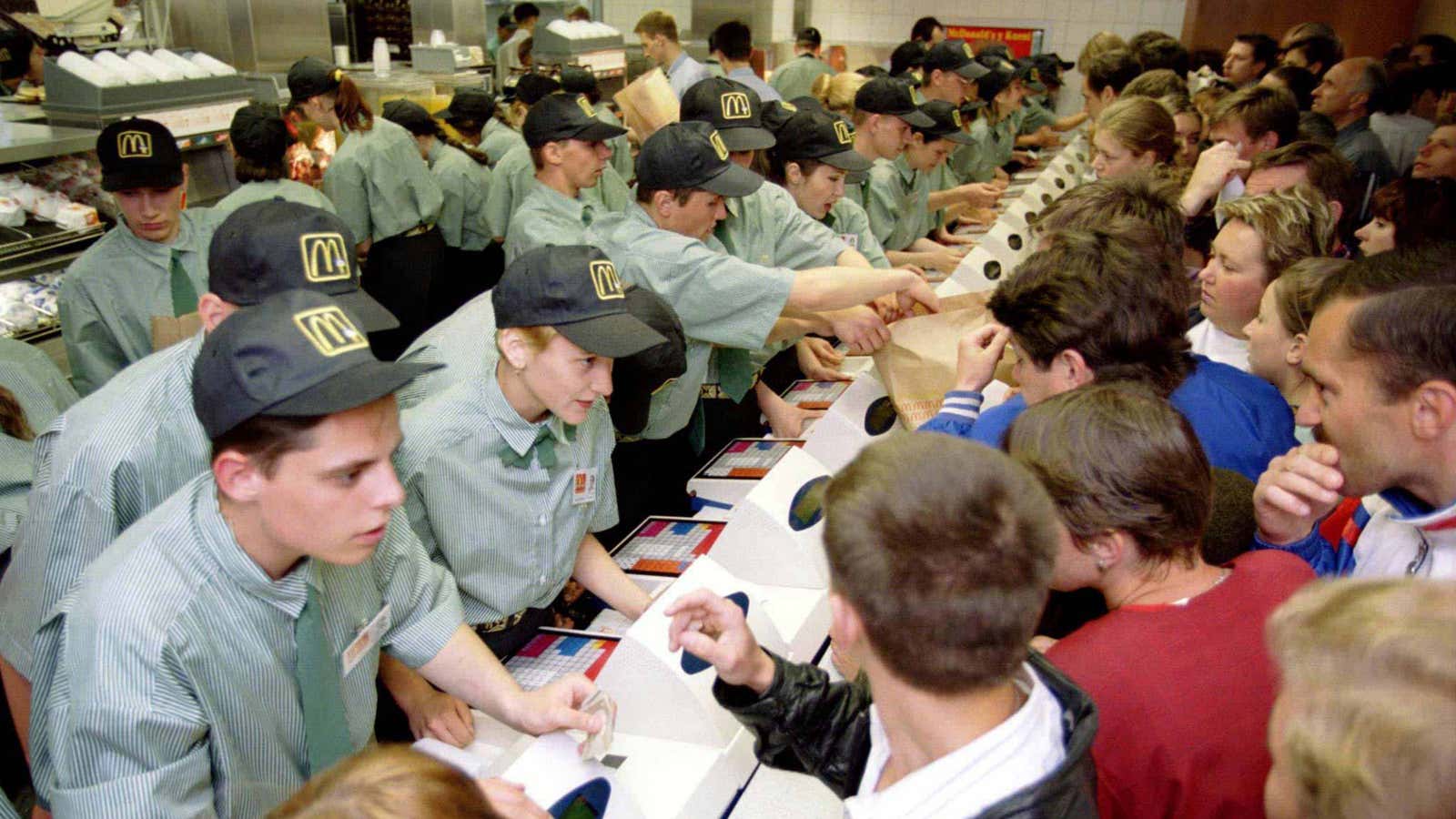The fast-food workers strike in the US raises an economic question. Should people be paid their market value or an income that ensures a dignified lifestyle? But defining the latter isn’t so easy. The Economic Policy Institute recently calculated how much a household needs to earn to get by. A “secure and modest” income for New York family of four topped $93,000—nearly double the median household income. That suggests most New Yorkers live in dire poverty.
Estimates like this show that living wage measures are completely arbitrary and that members of the upper middle class, both conservatives and liberals, aren’t well qualified to determine what’s an acceptable lifestyle for other people. The fast-food worker strikes began eight months ago in New York and later spread to other cities. Tensions rose further after a sample budget, put together by Visa and McDonald’s, demonstrated that a fast food job is not enough to cover basic living costs.
Economics defines wages as market prices that reflect a worker’s value of output and the scarcity of his or her skills. Dictating what people should be paid above their market rate—as the protests seek to do—has economic consequences. Demand is reduced when you increase a price above its market price. That suggests increasing the minimum wage will reduce employment. Different economic studies have tried to quantify by how much; some have found less sensitivity than others (pdf). But most economists agree that minimum wage laws only serve to reduce employment for low-skill workers.
If New York City passed a law requiring that fast-food workers be paid $93,000 a year, there would certainly be fewer such jobs. Yet while the economic arguments for a minimum wage are weak, there is a moral case to be made. Low-wage workers are getting an increasingly small share of the economic pie and struggle to meet their most basic needs. While the minimum wage may not be the best redistributive tool available, it can be effective. There is no perfect minimum wage to meet the variable costs of living across the country. The EPI study concedes, for example, that people in Mississippi can squeak by on just $48,000.
The striking workers, nationwide, are asking for $15 an hour, more than double the minimum wage. That large a jump will probably reduce employment and increase prices; there may be room to increase their wages some, but only up to a point.
Rather, they should focus on improved working conditions. The best way to ensure a dignified lifestyle for these workers is to enhance their ability to move up the economic ladder. Restaurant executives are quick to point out these are entry-level jobs, but there is scope for advancement—and with it higher pay and benefits. The National Employment Law Project refutes this claim by pointing out that barely more than 10% of workers in the fast food industry are professionals, managers or supervisors, concluding there’s little hope those workers will eventually end up in those better jobs.
But it’s not clear if that’s the right conclusion. Fast-food workers tend to be young and have high job turnover, which suggests people might leave fast food jobs, for a variety of reasons, before they’d be promoted. It is necessary to account for age and tenure before concluding these are dead-end jobs. Paying higher starting wages may encourage more worker retention, which may or may not be what fast-food restaurants desire from most of their employees. In fact, the high turnover may be an efficient sorting mechanism. For example, some workers who change jobs may have only planned on working there temporarily.
But this does not change the fact that it is harder lately for low-skill workers to move up through the economic ranks. Ideally, more should be done to encourage skill formation and advancement in low-pay jobs. That would ensure that workers will have a skill set that commands a higher market wage and more security. This might take policies that make providing benefits less burdensome for employers and others that increase incentives to retain and train full-time workers. It would be a mistake to make an arbitrary rule on what people of various skills and stages of their career should be paid.
Even if we strengthened the middle class, it is by definition the center of the income distribution. People have always struggled in low-paid jobs—even in the middle-class heyday of the 1960s. Young people, with less skills early in their career, who are in an entry-level jobs, will always and should be paid less than someone further along in their career. The important question is how to give them the opportunities and resources to escape poverty in a sustainable way. If we move the bottom rung of the ladder up too high, we might find it impossible for anyone to get on it in the first place.
